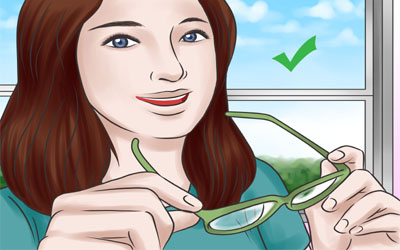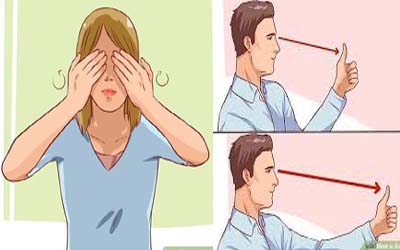
Eat lots of fruits and veggies!
Carrots, loaded with beta carotene are especially helpful in maintaining healthy eyes. That’s because beta carotene is an antioxidant that reduces the risk of macular degeneration Broccoli, bell peppers, and brussels sprouts are also great for your eyes, containing lots of vitamin C. Okay, they’re not the greatest tasting vegetables in the world (or maybe you love them, in which case good for you!) so dip them in hummus or other yummy yogurt spreads to make them palatable Wild salmon and sardines are also healthy options for your eyes. That’s because they contain omega-3 fats, which are the good fats for your body. These omega-3s protect tiny blood vessels in the eyes Sweet potatoes and spinach round out the healthy options for maintaining good eyes. Both contain beta carotene, and spinach contains lots of vitamin C, lutein, and zeaxanthin. Make the sweet spuds into home-fries with a bit of olive oil, and make spinach into a tasty side or a delectable dip.

Avoid wearing contact lenses for more than 10 hour
permanent sight damage as well as extreme discomfort to your eyes. Never sleep with your contact lenses on unless specifically instructed to do so. Your eyes need regular supplies of oxygen, and lenses block the flow of oxygen to the eyes, especially during sleep. So doctors recommend a normal period of break for your eyes during the night Avoid wearing your contact lenses when swimming. Your lenses could easily slip off your ideas when they come in contact with the surface area of the water. If you are wearing goggles, your contact lenses may be used while swimming.

Use allergen-reducing eye drops sparingly
Using an allergen-reducing eye drop during allergy season to ‘get the red out’ and sooth itchiness may help on a limited basis, but chronic daily use can actually make the problem worse. Allergen-reducing eye drops work by constricting the blood flow to the cornea, thereby depriving it of oxygen. So while your eyes don’t feel inflamed and itchy anymore, they’re actually not getting any oxygen from blood. That’s not ideal. Using redness-relieving eye drops chronically will cause more redness in your eyes. Your body gets so accustomed to the chemicals in the eye drops that they no longer work effectively. Read the labels of eye drops carefully; many drops cannot be used while wearing contacts.

Use cucumber on your eyelids
Press cold cucumber slices gently against eyelids 10 minutes before going to sleep at night to prevent puffiness Cucumbers contain as corbic acid and caffeic acid, which prevent water retention. These compounds help explain why cucumbers are used throughout the world to treat inflammation and dermatitis Green tea bags may also help prevent puffiness if applied to the eyes. Soak the tea bag in cold water for a few minutes and place over eyes for 15-20 minutes. The tannins in the tea should help reduce inflammation Read the labels of eye drops carefully; many drops cannot be used while wearing contacts.

Wear UV protective sunglasses
Get polarized lenses, NOT just darker lenses. The lenses that only make the world darker will just make your pupils dilate and don’t do a thing to stop the UV rays Prolonged exposure to UV rays can harm your eyesight, protection in youth can help prevent loss of eyesight in later years. Exposure to UV rays has been linked to cataracts, macular degeneration, pingueculae and pterygia, harmful conditions for the eyes. Since the damage to eyes from UV rays builds up over a lifetime, it’s important to shield children from harmful rays. Make sure your children wear hats and protective glasses when they are out in the sunlight for prolonged periods. Be sure to wear sunglasses even if you’re in the shade. Even though shade lessens UV and HEV exposure significantly, you’re still exposing your eyes to UV rays reflected off of buildings and other structures.

Try not to spend so much time
Try not to spend so much time looking at your computer screen (As a matter of fact, now would be a good time to give your eyes a break, since you’re not doing anything too important).While science hasn’t yet proven that looking at computer screens causes permanent eye damage, it may cause eye strain and dry eyes. The glare from computer screens causes muscle fatigue in the eyes, either from being too bright or too dark. People blink less when they’re looking at a screen, causing drier eyes. Make a conscious effort to blink every 30 seconds when you’re sitting down and looking at your computer screen to combat dry eyes.

Wear goggles
Wear goggles when appropriate Be sure to wear goggles or other eye protective wear when working with chemicals or any place with harmful airborne particulates. Minimize the transmission of harmful particulate matter into eye region.

Exercise your eyes
Exercise your eyes , and also be sure to , relax Try focusing your eyes on objects that are near to you, then objects that are far away. Repeat this process multiple times. Sit down, place your elbows on your hips, close your eyes and bring your closed eyes down, resting them on your palms. Keep your palms covering your eyes for 10 seconds. Open your eyes and repeat as necessary Stretch your arm out and place your thumb in the hitchhiker position. Focus your vision on your thumb while you slowly bring your outstretched arm closer to your body, until your thumb is about five inches from your face. Slowly zoom the thumb back to its original position, focusing on it with your eyes all the while.

Do not read in dim light
Do not read in dim light. Reading in dim light can cause eye strain but will not damage your eyes. If your eyes feel tired, stop for a while and take a break.

Understanding and Conquering Eye Diseases: Navigating Care at Mahesh Netralay
Top Tips for Maintaining Healthy Eyes: A Vision for Wellness
1. Regular Eye Exams: Schedule comprehensive eye exams with an eye care professional at least once a year, even if you have perfect vision. Early detection of eye conditions allows for timely intervention and better outcomes.
2. Balanced Diet: Incorporate foods rich in vitamins A, C, and E, as well as minerals like zinc and omega-3 fatty acids into your diet. These nutrients contribute to eye health and may help prevent age-related vision problems.
3. Stay Hydrated: Proper hydration is essential for overall health, including eye health. Drink an adequate amount of water daily to prevent dry eyes and maintain optimal hydration levels.
4. Protective Eyewear: When engaging in activities that pose a risk of eye injury or exposure to harmful UV rays, wear appropriate protective eyewear. Sunglasses with UV protection can help shield your eyes from the sun’s harmful rays.
5. Follow the 20-20-20 Rule: To reduce eye strain during prolonged screen time, follow the 20-20-20 rule. Every 20 minutes, take a 20-second break and look at something 20 feet away to give your eyes a brief rest.
6. Proper Lighting: Ensure that your work and living spaces are well-lit to reduce eye strain. Position your computer screen at eye level, and use adjustable lighting to minimize glare and reflections.
7. Avoid Smoking: Smoking is linked to an increased risk of eye diseases such as cataracts and age-related macular degeneration. Quitting smoking contributes not only to overall health but also to eye health.
8. Manage Chronic Conditions: Conditions like diabetes and hypertension can impact your eye health. Regularly monitor and manage these conditions with the help of healthcare professionals to reduce the risk of associated eye problems.
9. Adequate Sleep: Quality sleep is crucial for overall well-being, including eye health. Aim for 7-8 hours of restful sleep each night to allow your eyes to recover and rejuvenate.
10. Practice Good Screen Habits: Adjust the brightness and contrast of your screens to reduce eye strain. Position your screen at eye level and maintain a comfortable viewing distance. Blink frequently to keep your eyes moist.
11. Hygiene Practices: Wash your hands regularly to prevent the spread of infections to the eyes. Avoid rubbing your eyes, as this can introduce irritants and potentially cause damage.
Remember, caring for your eyes is an ongoing commitment to your overall well-being. By incorporating these simple tips into your daily routine, you can promote and maintain healthy eyes for a lifetime of clear vision.
